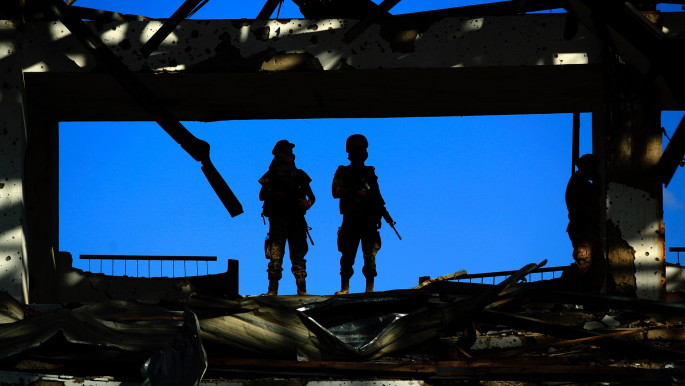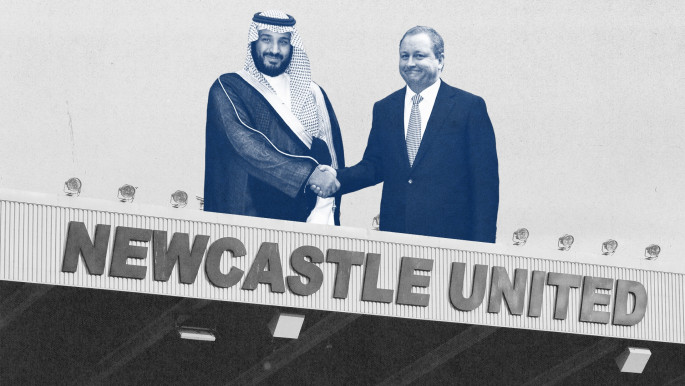How Saudi Arabia's tainted brand is slowing the kingdom's Newcastle United takeover bid
But despite reports claiming that the Premier League had already given Newcastle the green light for the £300million takeover, ongoing delays in the deal continue to cast doubt over whether it will materialise.
The bid is backed by Saudi Arabia's Public Investment Fund (PIF), chaired by Crown Prince Mohammed Bin Salman, which is said to be providing 80 percent of the funding. The remaining 20 percent will reportedly be contributed by Amanda Staveley's PCP Partners and British real estate moguls David and Simon Reuben.
For the Saudi Crown Prince, known as MBS, the takeover of the British football club represents the latest in a series of strategic moves in global sports, especially football, as the kingdom seeks to position itself as an international sporting powerhouse.
Despite several fails in the past, (including an attempt to organise and sponsor two new competitions under FIFA's umbrella), investing in football and sports is part of MBS's ambitious Vision 2030 reform program which seeks to reduce the country's dependence on oil and diversify its economy. Newcastle could become one of the jewels of Saudi Arabia's new approach.
 |
|
| Read more: Saudi Arabia's faltering divide and rule strategy in Yemen |
Saudi Arabia's poor public image
The acquisition is reminiscent of strategies by the United Arab Emirates (UAE) and Qatar to promote their states and project soft power through sport by funding and organising global sports events.
Acquiring ownership of clubs in the most prestigious football leagues, such as the UAE's acquisition of Manchester City in 2008 and the Qatari purchase of Paris St. Germain (PSG), together with considerable financial investments, have transformed these clubs into world-class brands.
James Dorsey, a senior fellow at the S. Rajaratnam School of International Studies at Singapore's Nanyang Technological University says that while the "UAE's approach has been always highly commercialised," as the Abu Dhabi United Group owns many clubs across the world beside Manchester city, Qatar's approach is less about money and much more related to soft power and the promotion of Qatar as a sports hub.
The Saudis, on the other hand, had not played this game until 2015, but with the rise of MBS it has become obvious that Riyadh seeks to follow their examples.
However, in Dorsey's opinion, the Saudi acquisition is different from those of Manchester City or PSG, considering both the current economic situation in which the bid is taking place as well the international reputation of the new owners, especially when it comes to the infamous human rights record of Saudi Arabia.
 |
Officials and human rights groups have expressed concerns over Riyadh's poor rights record, broadcast piracy and the brutal murder of journalist Jamal Khashoggi |  |
Neither Qatar nor the UAE have a bad public image and most of the world is willing to do business with them. In fact, Qatari and UAE officials "are both welcomed guests in any part of the world, which is much more difficult to say for MBS," said Dorsey
Strong opposition
Many human rights activists have put pressure on the Premier League to consider stopping the Saudi sovereign wealth fund from becoming the majority owner of Newcastle.
Amnesty International, for example, has repeatedly voiced concerns and urged Premier League chiefs to consider Saudi Arabia's rights record before approving the takeover, linking MBS with war crimes in Yemen and the brutal murder of Saudi journalist Jamal Khashoggi, as well as his "sweeping crackdown on human rights."
 |
|
| Read more: Stalled Newcastle United takeover exposes limits of what Saudi money can buy |
The bid has also been opposed by Khashoggi's fiancée, Hatice Cengiz, who said that the deal would tarnish English football and make it complicit in the "cover-up" of the journalist's murder by the kingdom.
In correspondence with the Premier League chief executive, Cengiz's lawyer, Rodney Dixon, stated that the rules clearly do not permit MBS and the PIF from "acquiring Newcastle in light of the available, credible evidence about his involvement in the murder of Jamal Khashoggi." Premier League chief executive Richard Masters revealed last week that calls to block the Saudi-led takeover bid are being "fully considered."
Opponents of the Saudi-led acquisition have also called for the activation of a special tool called the Fit and Proper Person Test, which is applied to anyone who takes over as a director or seeks to buy 30 percent of a club's shares in the Premier League. The league adopted it in order to protect the "reputation" of the sport and ensure that a "potential owner has not committed an act in a foreign jurisdiction that would be a criminal offense in Britain, even if not illegal in their own country."
 |
The Saudi bid has been described as a classic example of sportswashing, or reputation laundering |  |
However, despite the accusations, Dorsey says that technically human rights abuses are not part of the Fit and Proper Person Test. He also noted that MBS's involvement and actual role in the Khashoggi murder have not been technically proven "although we may assume that nothing happens in the kingdom without his approval and his close associates who were involved with the murder were either explicitly authorised or had a good reason to believe that this (liquidation) is something he wanted."
According to him, the Premier League may always argue that in the case of the Newcastle takeover approval his involvement was not "proven".
Some media pundits and experts have also described the Saudi bid as a classic example of sportswashing, or reputation laundering, a term used by Nicholas McGeehan, a researcher at Human Rights Watch, to explain the practice of using and investing in sport in order to improve the nation's global image and cover-up problematic issues.
 |
|
| Read more: Western firms complicit in the human cost of Saudi Arabia's dystopian Neom megacity |
According to Dorsey, all wealthy foreign investors use football as a soft power tool and acquiring a club from the Premier league would certainly help the Saudis to present themselves in a better light. It would be naive, however, to think that the acquisition per se and one bank transfer can simply fix MBS's reputation and erase Khashoggi's murder.
David Crossan, a freelance commentator and journalist passionate about football, told The New Arab that there is great potential at Newcastle, a one-club city with a city-center stadium, but that the takeover launch has redirected focus on Saudi Arabia's human rights record and the murder of Khashoggi.
Broadcast piracy
A much greater obstacle to the takeover, according to Crossan, is the pirate TV service beoutQ. The World Trade Organization (WTO) found that Saudi Arabia was behind the service offering illegal access to sport, including Premier League matches, directly threatening the league's commercial interests.
La Liga President, Javier Tebas, for example, accused the Saudis of "stealing football" through beoutQ's services, calling the Premier League to consider the "damage" that Saudi Arabia's pirating of broadcasts has caused the sport before it decides whether to approve a takeover.
 |
If the Premier League rejects the acquisition of the club it would be perceived as yet another of MBS's public relations fiascos |  |
The illegal broadcasts are closely linked to the ongoing Saudi feud with Qatar, as Doha's beIN Sports network owns the Premier League and La Liga rights but its services have been banned in Saudi Arabia after the kingdom introduced a land, sea, and air blockade on Doha in the summer of 2017.
The saga over the Newcastle United takeover, however, goes beyond football and sports. If the Premier League rejects the acquisition of the club it would be perceived as yet another of MBS's public relations fiascos, including multiple failed attempts to position the kingdom as a powerhouse in international football.
"The Premier League is between a rock and a hard place. It seems that the UK government has left this hot potato to the Premier League to deal with. And it is a tough decision. If the Premier League denies the acquisition, their decision is likely to have consequences for British-Saudi relations. MBS is not someone who would take kindly to a rejection," Dorsey told The New Arab.
Stasa Salacanin is a freelance journalist who has written extensively on Middle Eastern affairs, trade and political relations, Syria and Yemen, terrorism and defence





 Follow the Middle East's top stories in English at The New Arab on Google News
Follow the Middle East's top stories in English at The New Arab on Google News


